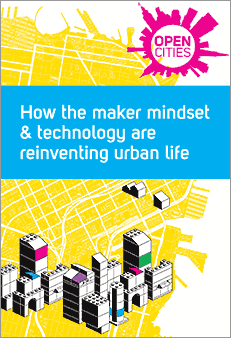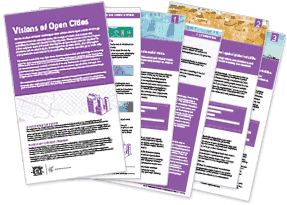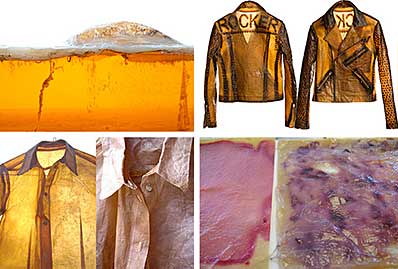Future Now
The IFTF Blog
Open Cities debuts at YBCA on Nov 7
The cityscape has become the canvas for the most pressing and exciting demonstrations of future life. When we want to understand the many ways our future is evolving, we look first to the examples of social, civic, and even biological lives that are led in cities around the world.
 Over the last several years, the Institute for the Future’s Technology Horizons Program has explored our urban futures with the help of leading thinkers, artists, activists and everyday people all over the globe. Now, we’re ready to share the latest research findings from this work.
Over the last several years, the Institute for the Future’s Technology Horizons Program has explored our urban futures with the help of leading thinkers, artists, activists and everyday people all over the globe. Now, we’re ready to share the latest research findings from this work.
On Saturday, Nov. 7 at 2:30 p.m. at the Yerba Buena Cultural Center for the Arts, we’ll be publicly debuting our research map and toolkit Open Cities: How the maker mindset & technology are reinventing urban life. Program Director Rod Falcon and Research Manager Eri Gentry will present the work, explaining the process we used to arrive at these findings and how you can use them to transform the future of your city. Copies of the research map/toolkit will be available at the launch event and digital copies are available online. The launch will take place at the YBCA event "Field of Inquiry: The Urban Future," which features works by artists, musicians, and various performers all themed around the urban future. It begins at 12 p.m. at the YBCA Galleries in San Francisco, CA.
The event marks the culmination of our own year-long stint as Artist-in-Residence at YBCA. Artists have always shown us the future through their works and IFTF has long believed that artists are a necessary part of any effort to experience or consider the future. As Artist-in-Residence, IFTF collectively led a year-long dialogue with a group of artists and creative thinkers selected by YBCA called the Urban Futures Network.
Tickets and additional information are available through YBCA’s website.
What Are Open Cities?
Over the last decade, a culture of makers, empowered by new production technologies and driven by an open source ethos, have reimagined the way that physical objects are created and distributed. Now, makers are bringing that same mindset to the urgent challenges in our cities.
In 2013, IFTF began conducting research to better understand the kind of change being instigated in Maker Cities around the world, where citizens and startups are a force alongside government and industry to develop and improve our urban infrastructure and build entirely new systems that touch nearly every aspect of civic life.
 Through this work, we discovered Maker Cities are quickly becoming Open Cities. Over the next decade, the amount of free and valuable urban data will increase dramatically and we can see an array of grassroots economies starting to take hold. Social media will empower citizens to self-organize and coordinate activity in new ways. Goods and services will flow through smart networks. And most importantly, populations will push their municipalities toward transformation.
Through this work, we discovered Maker Cities are quickly becoming Open Cities. Over the next decade, the amount of free and valuable urban data will increase dramatically and we can see an array of grassroots economies starting to take hold. Social media will empower citizens to self-organize and coordinate activity in new ways. Goods and services will flow through smart networks. And most importantly, populations will push their municipalities toward transformation.
Our research map and toolkit Open Cities: How the maker mindset & technology are reinventing urban life, is rooted in our years-long research and insight from work with cities around the world, from New York to Mexico City to Shenzhen. It forecasts the kinds of urban innovation we can expect in the next decade.
IFTF believes that the purpose of anticipating future change is to allow everyday people and organizations to take a more active role in making the future. The research map contains tools to help you think through how you can bring the maker mindset to your city in service of solving its most pressing issues and achieving its greatest aspirations. And it’s one of many ways we’re seek to use this research to affect change.
The Maker City Playbook
IFTF is teaming up with the Gray Area Foundation for the Arts, Make Media, Urban Manufacturing Alliance, and the Kauffman Foundation, to document Maker City examples and possibilities, to open-source the many civic initiatives going on today with information to replicate what works, and to learn from these experiments and adapt them in other contexts. Since the first ever White House Maker Faire in 2014, over 100 Mayors across the United States have committed to bolster Making in their communities. Powered by the Maker mindset and toolsets that democratize the entire process of physical creation and manufacturing, new modes of production and supply chains are returning to American cities. The development of the Maker City Playbook will document the Maker mindset in cities to bring national focus to the story of civic and economic reinvention taking place in America.
Bringing Bio and the Maker Mindset Together
IFTF’s research into how the Maker mindset can address civic challenges is still ongoing. And we see signs today that it is moving in a bold new direction.
 Already, citizen scientists are bringing biology of all kinds and the maker mindset together. Armed with open source and frugal science tools, they’re unlocking the secrets of our bodies and those of the entire plant and animal world. And they’re just getting started.
Already, citizen scientists are bringing biology of all kinds and the maker mindset together. Armed with open source and frugal science tools, they’re unlocking the secrets of our bodies and those of the entire plant and animal world. And they’re just getting started.
Bio data science is not only advancing rapidly, it’s also becoming more open. In 2005, sequencing the first human genome cost about $2.7 billion. Today, we are approaching a $1,000 genome, and could continuously decrease. Over the next 10 years, the availability of these kinds of tools will empower makers and artists with new tools for creative expression. This will allow them to create, hack, and remix on a totally new scale, responding to urban challenges through synthetic biology and biomimicry.
IFTF is currently continuing its exploration of the Maker Mindset by exploring bio futures, asking: How will artists and makers use biology to transform society, industry, and humanity in the next decade?
More Information
Contact Sean Ness at sness@iftf.org or (650) 233-9517 for more information about how to participate in this event or to learn more about the Technology Horizons program.
In addition, you can explore previous years' Technology Horizons research online, as well as subscribe to receive upcoming issues of IFTF's free News from the Future.



